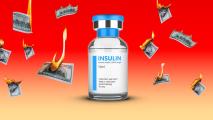
Biotech
Human history has been all but defined by death and disease, plague and pandemic. Advancements in 20th century medicine changed all of that. Now advancements in 21st century medicine promise to go even further. Could we bring about an end to disease? Reverse aging? Give hearing to the deaf and sight to the blind? The answer may be yes. And soon.
More
Sky-mapping system can predict whether cancer treatment will work
Johns Hopkins researchers are using image analysis developed for astronomy to study cancer immunotherapy.
New CRISPR tech could help us create superior crops of the future
A new CRISPR technology that focuses on gene activation rather than deactivation could help us create the superior crops of the future.
Hair-thin spine stimulator could relieve severe back pain
A new implant that delivers pain-relieving spinal cord stimulation can be put into place using just a needle — no invasive surgery required.
Pharma giant GSK embraces digital twins for vaccine development
Pharma leviathan GlaxoSmithKline is rolling out digital twins to help create “the vaccine factory of the future.”
Astronauts use CRISPR in space for first time
A first-of-its-kind experiment using CRISPR in space could help protect astronauts from DNA damage on long trips beyond Earth’s atmosphere.
“LEGO-like” vaccine protects mice from COVID, SARS, MERS, and variants
Using a “chimeric” spike protein, researchers have immunized mice against multiple types of coronaviruses with one shot.
CRISPR therapy cures first genetic disorder inside the body
For the first time, researchers appear to have effectively cured a genetic disorder by directly injecting a CRISPR therapy into patients’ bloodstreams.
Diagnosing infections without the lab — or wait
Researchers have developed a device that can test for infections in under an hour, no lab needed.
Inside the world of a robotic surgeon
Many of the world’s top surgeons are learning first-hand what they can do with surgical robots — and it’s unlocking a new era in health care.
A new superbug strategy
Researchers at the University of Geneva have a new idea on how to stop superbugs: don’t kill them.
Kidney donation vouchers shave years off wait times
Kidney donation vouchers appear to be working as hoped, increasing the number of donations and decreasing wait times for needed organs.
These mind-reading helmets could be a Fitbit for your brain
Kernel has developed two mind-reading helmets that record the same brain activity data as massive, million-dollar machines, but cost just $100,000.
There may be a way to reverse acetaminophen damage in the liver
New research out of Singapore suggests that a protein thought to help acetaminophen toxicity may do the opposite.
Flying race car zips across the sky for the first time
The world’s first flying race car, the Airspeeder Mk3, has completed its maiden flight and is on track to compete in a first-of-its-kind racing series later in 2021.
The augmented, virtual, human-machine future of surgery is here
Advancements in XR technologies are rapidly integrating into the future of surgery.
Series|
Just Might Work
Biohackers take aim at big pharma’s stranglehold on insulin
These biohackers plan to give away their instructions for how to make insulin for free.
Treatment appears to stop Alzheimer's in monkeys
NYU researchers have modified monkey’s immune system to slow their equivalent of Alzheimer’s disease and improve their cognition.
Urine test for brain cancer detects tumors of any size
A new urine test for brain cancer analyzed microRNAs to correctly identify 100% of patients with brain tumors, regardless of their tumor’s size.
Low doses of nitrous oxide may treat depression
A new, small study has found that low doses of nitrous oxide — laughing gas — can treat symptoms of depression.
MIT researchers can fit more drug in less pill
A new drug formulation method developed by chemical engineers at MIT can fit more drug into less pill.
Subscribe to the newsletter































